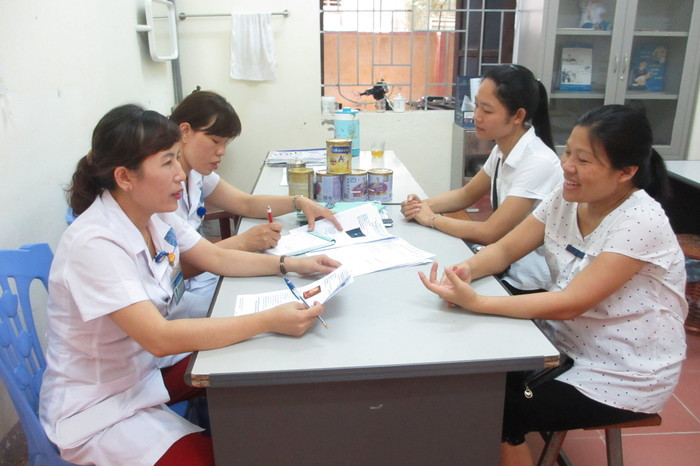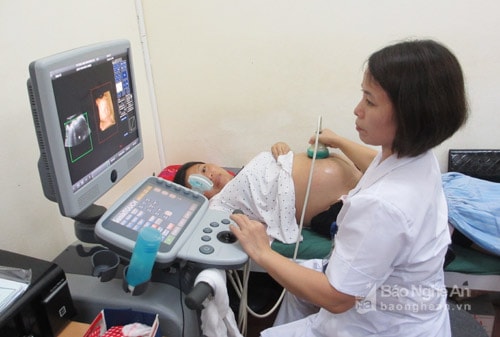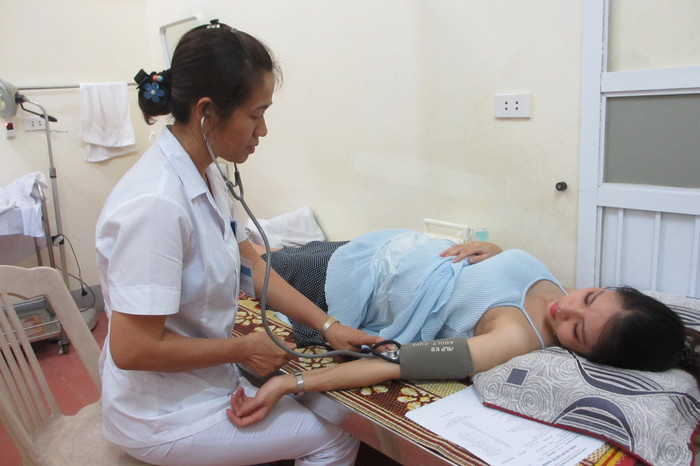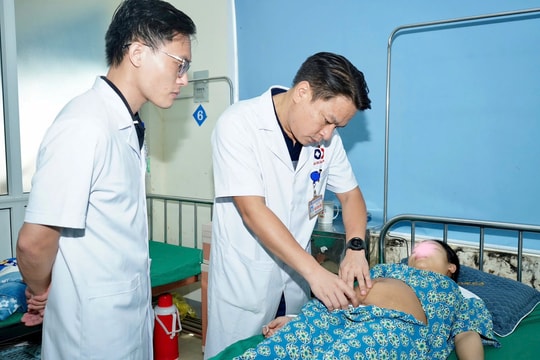Nghe An Reproductive Health Care Center: A reputable address for prenatal screening
(Baonghean) - Over the past 10 years, the Provincial Center for Reproductive Health Care has implemented routine and effective prenatal screening techniques for thousands of mothers. This technique helps diagnose early and screen for possible risks during pregnancy, while detecting and promptly treating fetal abnormalities; reducing the burden on families, contributing to improving population quality.
The need for prenatal screening
The Department of Maternal Health Care - Family Planning - Provincial Center for Reproductive Health Care (CSSKSS) receives more than 100 mothers every day for pregnancy check-ups and prenatal screening. In the past, parents had to wait anxiously for 9 months and 10 days to know if their child was born healthy, their weight, height... but now, with the advancement of science and technology, prenatal screening and newborn screening methods help children to be born with normal development and early diagnosis of pregnancies at high risk of malformations, avoiding serious consequences caused by congenital malformations.
 |
| Doctors and nurses from the Provincial Center for Reproductive Health Care provide health advice to pregnant women. Photo: Dinh Nguyet |
Prenatal screening is important, but in reality, there are still some mothers who, due to lack of interest, lack of understanding, or other objective and subjective reasons, have not performed prenatal check-ups on schedule. Doctor CKI Le Thi Hang - Head of Maternal Health Care - Family Planning Department, noted that mothers during pregnancy need to have an ultrasound at least 3 times at three different times (12 weeks, 22 weeks, and 32 weeks). These are also 3 important milestones in the process of monitoring the development and abnormalities of the fetus.
When the fetus is about 12 weeks old, doctors will perform an ultrasound to measure the nuchal translucency to screen for some risks of chromosomal abnormalities (causing Down syndrome, heart defects, limbs, diaphragmatic hernia, etc.). After 14 weeks, these indicators are no longer accurate. In addition to ultrasound, doctors also combine double test and triple test. Double test combined with morphological ultrasound and ultrasound to measure nuchal translucency (clear space under the nuchal skin) helps doctors diagnose whether the fetus has abnormalities or deformities.
In some cases where it is uncertain whether the fetus has a disease or not, or if the pregnant woman forgets to do the Double test, the doctor will order the pregnant woman to do the Triple test. Usually performed from 14 to 22 weeks of age; helps detect congenital malformations in the child. If the ultrasound results show a nuchal translucency of 3mm or more, plus a positive Double test or Triple test result, amniocentesis will be advised in the 16th - 18th week of pregnancy. Amniocentesis can help detect chromosomal abnormalities such as: Trisomy 21 causing Down syndrome, Trisomy 13 or 18 causing multiple malformations.
 |
| The provincial Center for Reproductive Health has a team of highly qualified doctors and nurses, along with a modern 4D ultrasound system, supporting the effective implementation of prenatal screening techniques. Photo: Dinh Nguyet |
Prenatal screening is the best method of taking care of the health of mothers and fetuses. Dr. Le Thi Hang - Head of the Department of Maternal Health Care - Family Planning recommends: Some fetal abnormalities such as neural tube defects can be prevented if adequate micronutrients are supplemented. Therefore, women who intend to get pregnant should have prenatal check-ups to take proper care of their health. When discovering pregnancy, they need to go for an early prenatal check-up to accurately monitor the gestational age, the health of the fetus and the risks that may be encountered, in order to handle them promptly. If mothers do not comply with the prenatal check-up and screening schedule, the detection of abnormalities in the fetus will no longer be accurate.
Prestigious address for prenatal screening
In her fourth month of pregnancy, Ms. Phan Hoai Thanh (Nam Dan) was regularly taken by her family to visit and examine at the Provincial Center for Reproductive Health Care. She said: “Although my house is quite far away, I chose the Provincial Center for Reproductive Health Care, a prestigious address with many years of implementing effective prenatal screening techniques, with reasonable advice. Because when pregnant, every mother wants to give birth to a healthy, intelligent baby. The doctors at the center visited, examined and consulted very dedicatedly, helping me adjust my diet, supplement vitamins, and take care of my pregnancy properly, so that up to now the fetus has developed healthily.”
 |
| Every year, the provincial Center for Reproductive Health Screening conducts prenatal screening for over 11,000 pregnant mothers, detecting many cases of fetal malformations. Photo: Dinh Nguyet |
Ms. Dinh Thi Thanh Thuy (Quan Bau Ward, Vinh City) has been with the Provincial Center for Reproductive Health Care both times she was pregnant. She said: “During my first pregnancy, I had a check-up and gave birth to a healthy, safe baby at the center. The doctors took good care of me and monitored my pregnancy and my health; they gave timely diagnoses and advice to help me supplement and balance my nutrition, which is good for my pregnancy. So this time, I continued to choose the center to take care of my health and the fetus.”
For more than 10 years, the Provincial Center for Reproductive Health Care has implemented prenatal screening techniques in maternal and fetal health care with high efficiency. Doctor CKII - Associate Professor Nguyen Ba Tan - Director of the Provincial Center for Reproductive Health Care said: To implement this technique effectively, the center has invested in a system of modern technical machinery; 4D color ultrasound machine. The center also cooperates with prestigious medical units in Hanoi to conduct screening tests. The team of doctors of the Maternal Health Care Department has received basic training. 6 specialized doctors directly performing prenatal screening examinations are assigned by the center to take turns participating in training courses to improve their professional knowledge taught by professors and doctors at the Central Obstetrics Hospital and professors from France. The department also established a professional team, regularly organizing consultations to promptly detect and handle abnormal cases in pregnant mothers. From there, doctors always give useful advice and reasonable consultation to mothers, to have healthy babies.
| Over the past 10 years, on average, the Provincial Center for Reproductive Health conducted prenatal screening for 11,120 pregnant women each year. Of these, more than 70 cases of fetal malformations were detected through screening. |
In the coming time, in addition to focusing on investing in equipment and improving the quality of medical staff, to maintain the effectiveness of prenatal screening, the center organizes health consultation sessions for pregnant women every Monday and Thursday morning. At the same time, during the year, the Provincial Center for Reproductive Health Care coordinates with units and localities to organize health consultation activities to improve understanding and knowledge for mothers in taking care of their own health and that of their fetuses. The goal is to do well in prenatal screening and fetal health care, contributing to improving the quality of the population and race, ensuring social security.
Dinh Nguyet - Thu Hien
| RELATED NEWS |
|---|








